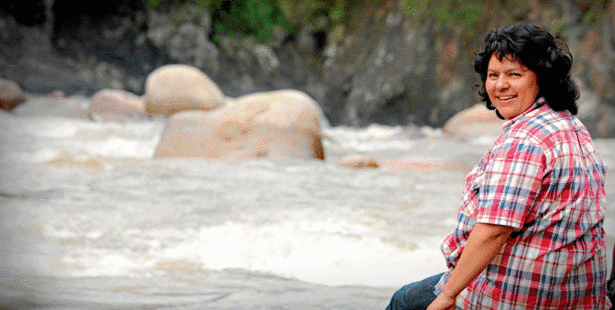7 March 2016 3 menit
Honduran Leader Berta Cáceres Murdered in the Midst of a Life Defending Her Community


March 4, 2016
Kate Conradt
This is a cross-post from the AFL-CIO Now blog.
In her life and in her death at the hands of assassins this week, Berta Cáceres, a leader in Honduran struggles for social justice, exemplifies the difficult choices that so many Central American communities have faced over the past 40 years. When the region was torn by Cold War struggles and civil war, Cáceres’ family gave shelter and support to those fleeing the violence in El Salvador. As a tenuous peace was achieved, and many Hondurans faced poverty and violations of their rights, she went on to study and emerged as a leader for the rights of the Lenca people to stay on their land and sustain their rural communities, rather than migrate to cities that have become some of the most violent in the world or to the United States seeking safety and opportunity for decent work and better lives for their children.
Cáceres chose to stay in Honduras and, for more than 20 years, led the Council of Indigenous and Popular Organizations of Honduras, the organization she and other students founded to defend the rights, land and interests of the Lenca. She also chose to stay with her family and raise her four children in their community. In the aftermath of the 2009 coup, she stood out as a leader of the massive movement of Hondurans who rejected the removal of their democratically elected president and the violent repression that has characterized the Honduran government since the coup. Some 200 social, environmental and labor activists, and organized opposition party members have been killed since the coup.
Every day, Honduran workers face violations of their rights and labor laws by employers and inaction by the government. Commitments made to defend these rights in the Dominican Republic-Central American Free Trade Agreement remain unfulfilled, nearly four years after Honduran workers filed a formal complaint, along with the AFL-CIO.
While Cáceres and COPINH were recognized for their work by the Goldman Environmental Prize in 2015, the danger they face also was recognized by the Inter-American Commission on Human Rights, which granted her protective measures against the many threats Cáceres and her allies face in Honduras. In 2013, the IACHR denounced “the complete absence of the most basic measures to respond to grave violations of human rights” in Honduras.
The United States has a special responsibility to ensure the Honduran government fulfill its responsibilities. As part of its ongoing support to the post-coup governments, the United States must review the country’s compliance with human rights. As Sen. Patrick Leahy (D-Vt.) noted this week, “The immediate question is what President [Juan Orlando] Hernández and his government—which has too often ignored or passively condoned attacks against Honduran social activists—will do to support an independent investigation, prosecution and punishment of those responsible for this despicable crime.”
The AFL-CIO joins many allied organizations in Honduras, elsewhere in Latin America and the United States, in sending our deepest condolences to the family, friends and community of Berta Cáceres, in denouncing her assassination and demanding a thorough investigation of those responsible for planning and executing her murder.
We also note that another leading activist, Gustavo Castro, was wounded during the assassination. As a key witness to the murder, he must be protected and given every opportunity to testify about this horrible crime.
Link:
http://www.solidaritycenter.org/honduran-leader-berta-caceres-murdered-in-the-midst-of-a-life-defending-her-community/
